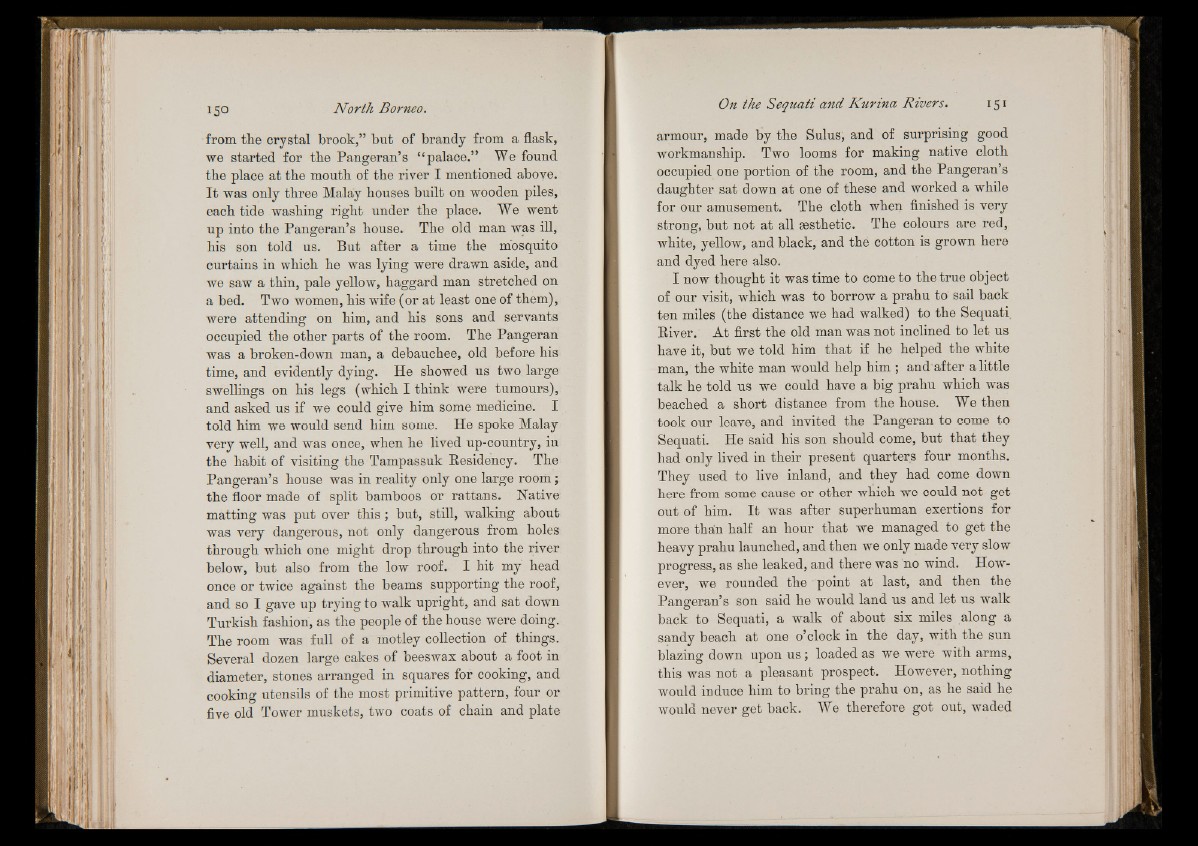
from the crystal brook,” but of brandy from a flask,
we started for the Pangeran’s “ palace.” We found
the place at the mouth of the river I mentioned above.
I t was only three Malay houses built on wooden piles,
each tide washing right under the place. We went
up into the Pangeran’s house. The old man was ill,
his son told us. But after a time the mosquito
curtains in which he was lying were drawn aside, and
we saw a thin, pale yellow, haggard man stretched on
a bed. Two women, his wife (or at least one of them),
were attending on him, and his sons and servants
occupied the other parts of the room. The Pangeran
was a broken-down man, a debauchee, old before his
time, and evidently dying. He showed us two large
swellings on his legs (which I think were tumours),
and asked us if we could give him some medicine. I
told him we would send him some. He spoke Malay
very well, and was once, when he lived up-country, in
the habit of visiting the Tampassuk Residency. The
Pangeran’s house was in reality only one large room;
the floor made of split bamboos or rattans. Native
matting was put over th is ; but, still, walking about
was very dangerous, not only dangerous from holes
through which one might drop through into the river
below, but also from the low roof. I hit my head
once or twice against the beams supporting the roof,
and so I gave up trying to walk upright, and sat down
Turkish fashion, as the people of the house were doing.
The room was full of a motley collection of things.
Several dozen large cakes of beeswax about a foot in
diameter, stones arranged in squares for cooking, and
cooking utensils of the most primitive pattern, four or
five old Tower muskets, two coats of chain and plate
armour, made by the Sulus, and of surprising good
workmanship. Two looms for making native cloth
occupied one portion of the room, and the Pangeran’s
daughter sat down at one of these and worked a while
for our amusement. The cloth when finished is very
strong, but not at all sesthetic. The colours are red,
white, yellow, and black, and the cotton is grown here
and dyed here also.
I now thought it was time to come to the true object
of our visit, which was to borrow a prahu to sail back
ten miles (the distance we had walked) to the Sequati.
River. At first the old man was not inclined to let us
have it, but we told him th a t if he helped the white
man, the white man would help him ; and'after a little
talk he told us we could have a big prahu which was
beached a short distance from the house. We then
took our leave, and invited the Pangeran to come to
Sequati. He said his son should come, but that they
had only lived in their present quarters four months.
They used to live inland, and they had come down
here from some cause or other which we could not get
out of him. I t was after superhuman exertions for
more than half an hour that we managed to get the
heavy prahu launched, and then we only made very slow
progress, as she leaked, and there was no wind. However,
we rounded the point at last, and then the
Pangeran’s son said he would land us and let us walk
back to Sequati, a walk of about six miles along a
sandy beach at one o’clock in the day, with the sun
biazing down upon u s ; loaded as we were with arms,
this was not a pleasant prospect. However, nothing
would induce him to bring the prahu on, as he said he
would never get back. We therefore got ont, waded